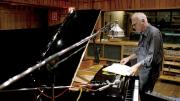Pianist and composer Steve Kuhn ’59 has played in formidable quartets and quintets, inventive big bands, graceful string orchestras. He’s also won admiration as a thoughtful and articulate soloist. But despite the range of company he’s kept throughout a five-decade career in jazz, Kuhn has always returned to the piano trio, his favorite setting since he became a bandleader in the 1960s.
“The interpretation of the song is in my hands,” he explains. “At the same time, it’s conversational. Rather than having bass and drums provide an accompaniment, the musicians respond to me. I respond to them. The music passes between us and we all have an equal part in it.”
For Wisteria, his latest CD, Kuhn pursued that kind of intimate dialogue by selecting two musicians with whom he enjoys an extraordinary level of comfort: bassist Steve Swallow and drummer Joey Baron. “The three of us had never played before as a group,” Kuhn says, “but Joey and I go back 20 some-odd years. He has an infectious spirit and it gives the music a certain color. Swallow and I go back over 50 years. He’s the brother I never had.” Kuhn was 25 when he and the bassist met, working side by side in the rhythm section for venerated trumpeter Art Farmer.
Kuhn always had a clear direction. “From the time I was babbling as a baby,” he says, “this was the only thing that I ever wanted to do.” That’s barely an exaggeration. A child prodigy, he could identify the records of Benny Goodman, Count Basie, and Duke Ellington before he could really talk, by picking out the labels. The feat was so incredible that humorist H. Allen Smith, who learned of it, Kuhn has reported, from a family friend, concluded his best-selling 1941 collection, Low Man on a Totem Pole, with his impressions of the precocious toddler.
As a teenager in Boston, Kuhn studied with distinguished pianist and jazz sympathizer Margaret Chaloff, whom he credits with enabling him to get a broad spectrum of color from the piano. Her son Serge became a well-known jazz baritone saxophonist as well as Kuhn’s friend and early collaborator. “People like Charlie Parker and Dizzy Gillespie knew her because of Serge,” Kuhn says. “Many of the pianists who came to Boston to play at [jazz clubs] Storyville and the Hi-Hat would call her for a lesson.”
Kuhn had his own gigs at Storyville playing solo piano as a teen. At Harvard, he studied music theory by day with Walter Piston and led the house trio at a club in Harvard Square, the Mount Auburn 47 (better known as the Club 47), five nights a week. After graduation, he won a scholarship to the Lenox School of Jazz from Schaefer Brewing (which featured jazz artists promoting its beer). The renowned faculty, which, during Kuhn’s summer there, included members of the Modern Jazz Quartet, George Russell, and Gunther Schuller, mixed freely with the “students”—emerging talents like soon-to-be avant-garde icon Ornette Coleman. When Kuhn moved to New York weeks later, trumpeter Kenny Dorham, one of his Lenox teachers, hired him as the pianist for his quintet. In the next few years, Kuhn worked with legends John Coltrane, Stan Getz, and Art Blakey, leading to his job with Art Farmer.
“Wisteria,” the title track from Kuhn’s new release, is one of Art Farmer’s lesser-known compositions. “He never played it when I worked with him in 1964,” Kuhn recalls. “I knew it from an old 10-inch Prestige LP recorded in the early 1950s. It always stuck with me. I hunted down a lead sheet because I wanted to see exactly how he wrote it, and it was very simple.” Kuhn eases through the melancholy ballad warmed by Baron’s cymbal work and Swallow’s resonant bass tones. Swallow’s instrument, a modified electric five-string (rather than the acoustic instruments most jazz musicians prefer), sounds particularly guitar-like as it sweetly climbs into the upper register for his solo.
Two of Swallow’s compositions also appear on Wisteria: the moody “Dark Glasses” and stylish “Good Lookin’ Rookie,” both offering ample playgrounds for the musicians’ improvisations. “He’s one of my favorite composers,” Kuhn volunteers. “I’ve played more of his songs than those of any other composer—except for myself.”
Most of the compositions on the album are indeed Kuhn’s own. “Adagio,” “Morning Dew,” “Pastorale,” and “Promises Kept”—all written for a gorgeous string orchestra recorded on Promises Kept in 2000—were originally pretty yet sparse, keeping the nonswinging string players tethered to the arrangements. It was a challenge to recast them for the trio, but one Kuhn eagerly undertook because the smaller number of performers would offer more frequent opportunities to play the pieces. “We could be so much freer,” Kuhn states. “Having an orchestra is an amazing gift, but there’s nothing we couldn’t say with just the three of us.”








